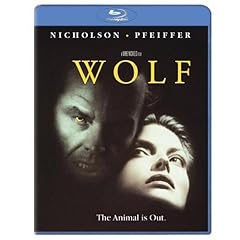

Let's face it. We're all animals. Sure, we walk upright and have opposable thumbs. We have written language and opera and all that. But we are no less driven in our base desires than any other creature on the planet. This realization underlies the most unusual monster movie Wolf, Mike Nichols' underrated 1994 hybrid not only of wolf and man, but also of satire and horror.
Wolf benefits from a literate and witty script attributed to Jim Harrison (novelist of Sundog and Warlock) and Wesley Strick (Cape Fear). It seems clear that Nichols and star Jack Nicholson also left their fingerprints on the material, which deals frankly with a character they knew well: an aging workhorse with plenty to offer but brushed aside by corporate culture in favor of hot young talent more likely to generate revenue. Nicholson plays New York book editor Will Randall, a methodical and laconic foot soldier who has seen it all. Though he's won the loyalty of celebrity clients, Will is vulnerable when his publishing company weathers a takeover by billionaire Raymond Alden (Christopher Plummer). In the film's opening sequence, Will gets a wolf bite while on the road for business. But before the supernatural effects kick in, rendering him a modern-day "wolfman," he faces an arguably more horrific experience: being stabbed in the back by a colleague.
Offered a consolation-prize demotion, Will quits, but the effects of the wolf bite have heightened his senses, his energy and his "killer instinct." As Dr. Vijay Alezias (Om Puri) counsels Will, "The demon wolf is not evil, unless the man he has bitten is evil. And it feels good to be a wolf, doesn't it? Power without guilt. Love without doubt." Instead of taking the career reversal lying down, he rallies his staff and his former clients, then sets out to reclaim his position. His new mojo also serves him well when he intrigues a beautiful woman, Alden's restless and rebellious daughter Laura (Michelle Pfeiffer). Becoming a wolf means a tug-of-war within Will's soul: will he remain "the last civilized man," as Laura initially pegs him, or will he follow his primal instincts, his animalistic id? The reunion of Nicholson and Pfeiffer (who previously teamed on The Witches of Eastwick) has heat, though Pfeiffer's role is a bit underwritten.
Much of what makes Wolf a success bound to have a long shelf life—aside from its ingenious premise—is the sheer filmmaking skill on display in every department. The deep-bench cast includes James Spader at his best, Kate Nelligan, David Hyde Pierce, Richard Jenkins, Ron Rifkin, Prunella Scales and, in small roles, Peter Geraghty, David Schwimmer, and Allison Janney. Nicholson owns the show in one of his best and most subtle performances; under Nichols' sure guidance, smilin' Jack expertly contains his lupine mannerisms to play an essentially ordinary guy who deserves better and, for better or worse, gets a blessing and a curse. The elegant production design by Bo Welch (Batman Returns), special makeup effects of Rick Baker, photography of Giuseppe Rotunno, and insinuating score by Ennio Morricone—added to Nichols' controlled direction and Nicholson and Pfeiffer's star power—create an eccentric film that may well be regarded, decades hence, as a movie classic.

|
|
 |
In its Blu-ray debut, Wolf gets a bare-bones treatment. Though the disc is BD-Live enabled, its only real "extras" are trailers for unreated films. So the not-insignificant value here is in the A/V upgrade: though the results will not take anyone aback, Wolf is unlikely ever to look better than it does in this hi-def rendering. Even on screen, Wolf is designed to look a bit dim and murky; it's part of the film's mood. So the video transfer here is accurate and happily no digital tinkering gets in the way of what Nichols got on celluloid. Color seems reasonably accurate, though flesh tones run ruddy, and detail easily trumps the previous DVD editions: black level is, I believe, intentionally murky, and contrast is likewise on the soft side. It's all part of a transfer that does a good job of retaining a film-like appearance; just don't expect hi-def "pop" from this one. Audio is DTS-HD Master Audio 5.1, and though the dialogue occasionally sounds terribly muddy, I have to believe there's a failing in the source material for the audio of those scenes; otherwise, the lossless track is adequate. This is a film deserving of reappraisal, and there's no better way to give it a fair shake than on Blu-ray.
 |